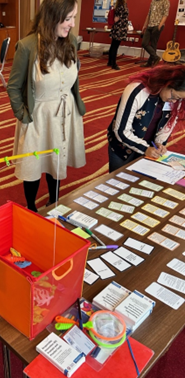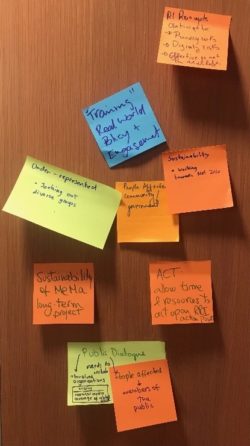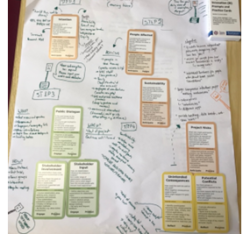20
12
.23
Dive into RRI and beyond – hoRRIzon 3.0 legacy and impact project
The hoRRIzon 3.0 project builds on previous work within Horizon Digital Economy Research and the Trustworthy Autonomy Systems (TAS) Hub which explored and supported Responsible Research and Innovation (RRI) practice and developed tools to help engagement and implementation of RRI.
As part of a Horizon Advisory Board event held on the 30th of November, we ran an interactive hands-on game activity: Dive into RRI. We used magnetic objects matching the coloured suits of the RI Prompts and Practice Cards (RI Cards). The colour(s) of the picked object led the player to randomly pick up a card, consider the relevance of the card in the context of their current project and then write a word/comment related to the card – resulting from that reflective exercise – on a post-it note. The activity provoked reflection, discussion, critical thinking and some interesting topics were highlighted by participants (e.g., inclusion of underrepresented voices, allocation of time and resources and sustainability), as shown in the images below.


As in previous activities, the RI Cards were well received, not only by Horizon’s researchers and academics, but also by members of the Horizon Advisory Board, including representatives from Microsoft, UKRI and the BBC R&D. They were impressed with how tangible and accessible we make the subject, clearly detailing the steps needed to be taken to consider RRI implications and action plans.
Supporting RRI Practice and Training. We have also been supporting RRI practice to the wider Horizon and TAS Hub community and have delivered training to Horizon CDT students and AI DTC at the University of Nottingham. One of the activities students undertook this term was to use the RI Cards to identify RRI priorities within a Horizon research project and to create a follow-up RRI Action Plan to address them (see image below). We have also used other tools as part of the RRI training module (e.g., EDI Cards).

To maximize the reach and impact of the RI Cards, we have currently disseminated 150 decks to researchers, innovators, UKRI CDTs and to industrial partners in the UK, USA and Australia. We have run more than 50 events with the RI Cards and have requested participant’s feedback to enable us to keep improving and adapting our tools and to feed this into the research evaluation we are conducting. We are delighted with the comments received so far (examples below):
“Before this exercise, I was not aware of this concept. Now I have realized this useful resource for my future projects.”
“The experiential aspect of putting theory to action was incredibly helpful.“
“The questions and actions on the cards supported me in understanding about foresight and planning for (un)intended consequences. Discussion using the cards helped me to better understand how to differentiate between ethics and RRI, as well as where the overlaps exist.”
“Most importantly the cards helped me to identify unintended consequences, which I am now able to apply mitigations to protect against.”
Other examples of the wider reach and use of the RI Cards include the RRI focused activities that will incorporate this tool to support RRI embedded practice to the RAI UK ecosystem. Examples of this include collaborations with BRAIDUK and the IEEE S.A as part of the RAKE project (RAIUK Impact Accelerator funds).
Written by Virginia Portillo & Hazel Sayers
Tags:
BRAIDUK,
EDI,
horizon cdt,
IEEE,
RAI UK,
responsible research and innovation,
RRI,
Trustworthy Autonomous Systems (TAS) Hub

















